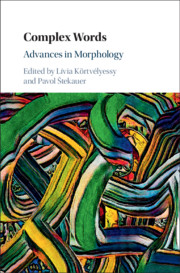Introduction: Advances in Morphology
A Summary
Published online by Cambridge University Press: 18 September 2020
Summary
In many domains of linguistics, theoretical differences have led to entrenchment and a certain degree of fragmentation. Morphology seems to be different. Theoretical positions differ substantially, but the differences never get in the way of informing oneself about the reasons for adhering to a different framework, making use of it. In this volume, the following frameworks are discussed: a-morphous morphology (Anderson 1992), word and paradigm morphology (Blevins 2016), paradigm function morphology (Stump 2001, 2016), onomasiological approaches (Dokulil 1962, Štekauer 1998), construction morphology (Booij 2010), lexical semantic framework (Lieber 2004, 2016), and neo-constructionist approaches (Hale & Keyser 2002) such as distributed morphology (Embick 2015). This volume thus contains a wealth of theoretical approaches, methodologies, and descriptive issues: a fitting tribute to a linguist who made it his hallmark to serve the linguistic community with a broad range of textbooks, monographs, and research articles.
- Type
- Chapter
- Information
- Complex WordsAdvances in Morphology, pp. 1 - 16Publisher: Cambridge University PressPrint publication year: 2020

